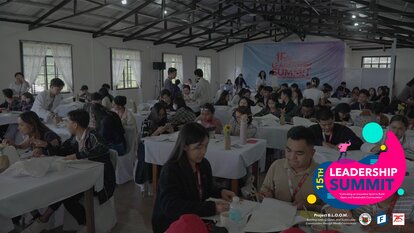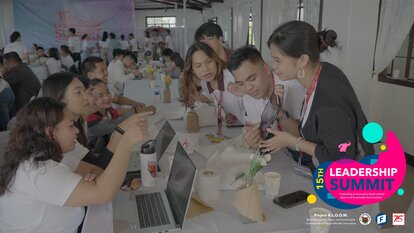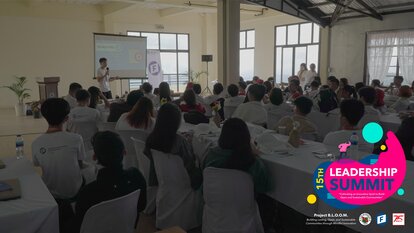Youth Leadership
Youth-Led Innovation: Capstone Projects at the Forefront of Community Development

Many of FNF Philippines' partners in recent months have echoed the sentiment of young people in the Philippines today being more technologically adept and socially incisive compared to previous generations at their age. Recognizing their potential, FNF Philippines recently joined forces with the University of Baguio for their 15th Youth Leadership Summit held at the Nature Tower Hotel in La Trinidad, Benguet. The two-day summit aimed to empower student leaders in addressing developmental challenges through sustainable solutions.
The summit, attended by 86 participants, unfolded as a series of talks, workshops, and the presentation and defense of several capstone projects. Focusing on advocacy campaigning, school organizing, and sustainability, the summit helped equip the students towards building open and sustainable communities.

Eight groups pitched their ideas, where they were able to employ knowledge in project management gleaned during the first day of the summit. A feedback mechanism was put in place so that each group, as well as the mentors, could provide insights on the projects and address potential concerns regarding feasibility.
The first group proposed repurposing shredded plastic waste as an additional aggregate. Their project aimed at creating revenue streams for participating organizations that would encourage long-term involvement past the initial campaign. While recognized for its creative solution, concerns were raised about the project's sustainability and coordination challenges with various organizations. A different group sought to address the importance of media literacy through their project titled: Digital Detectives. The group sought to raise awareness through online webinars and publications that could help students in their colleges and other universities identify disinformation before they disseminate news on their respective social media platforms. This project garnered praise for its strong visual presentation. The group was encouraged to articulate their goals more explicitly to ensure effective implementation.
One notable project, nicknamed TRAP, proposed a Transparency Report being implemented on a collegiate level among student councils that would be accessible to the public. Acknowledged for its realistic timeline and well-intentioned approach, the group was encouraged to revisit its title, recognizing the probable impact of language on perception and acceptance. Despite this, the mentors all applauded the team members for their courage to implement what could potentially be a divisive project among the local colleges in Baguio. This project would essentially train student councils in performing audits and accountability checks - a skill that they would be able to bring should they pursue governance on a barangay or local level.

Another commendable initiative sought to address the mental health gap through a comprehensive intervention approach. The mentors recognized the project's ambition to extend the work of the Peer Facilitators group, it stood out as an example of leveraging existing mechanisms for community improvement. With a focus on mental health awareness, another project titled: “You are Heard” - Awareness on Your OWN Mental Health, proved to be more ambitious than the previous project. The mentors cited a potential wrinkle regarding substantial funding needs and recommended that the team pursue collaboration with projects, or groups like the previous team, that have similar initiatives. It was cited that their overlapping goals could create a bigger impact if done in partnership.
Presenting a well-thought-out proposal, another group presented Project Paw Patrol that hoped to address animal welfare for stray cats and dogs. Commended for its clarity and potential scalability, the group received encouragement to explore avenues for expanding the project's reach. On the other end of the spectrum, Project ABAKAdunong aimed at creating a broader impact. The group's intent to alleviate illiteracy through immersion programs was ambitious and required several phases of implementation. However, concerns were raised about its extensive scope, and a suggestion was made for a proof of concept or pilot run to make the project more feasible.

One of the groups sought to address the very relevant issue of elections in the youth council. Because the summit was held one month before the next SK election, this group focused on empowering students through voting literacy. Feedback centered on designing an engaging awareness campaign and forming partnerships with credible organizations to help streamline the process.
These projects not only reflected the creativity and passion of the student leaders but also sparked critical discussions about community engagement and impact. As the summit concluded successfully, these visionary projects serve as a testament to the potential and innovation of the youth in actively shaping their communities for the better.
While the pitches would encapsulate only the first step of the different projects, the summit was able to provide the students a platform to put their ideas into paper. The initiative hoped to lay the groundwork for future community leaders and test the student's tenacity towards the intricacies of collaboration and feedback. Leadership development would always entail a measure of self-awareness and adaptability, and as the event concluded, all the mentors unanimously cited how the students exhibited an expertise beyond their years. As the students progress beyond the confines of the summit, FNF and the University of Baguio share the same confidence that continued investment in the youth holds a promising future.

